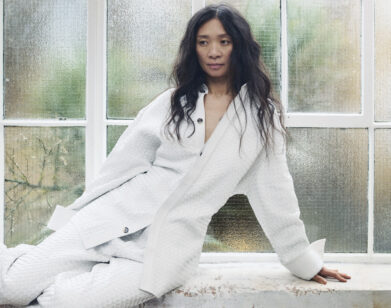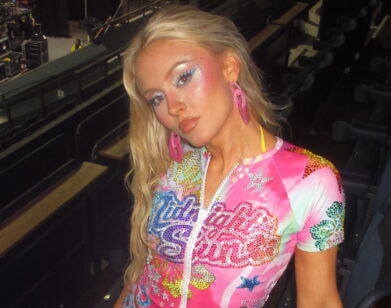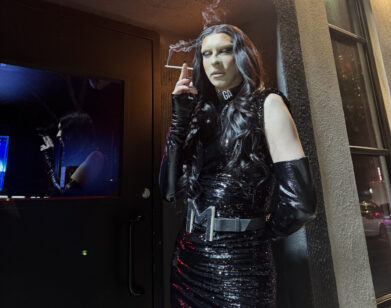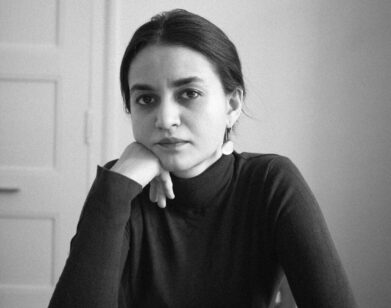Mark Ronson Tells His Friend Rashida Jones What It’s Like to Dance and Be Sad at the Same Time
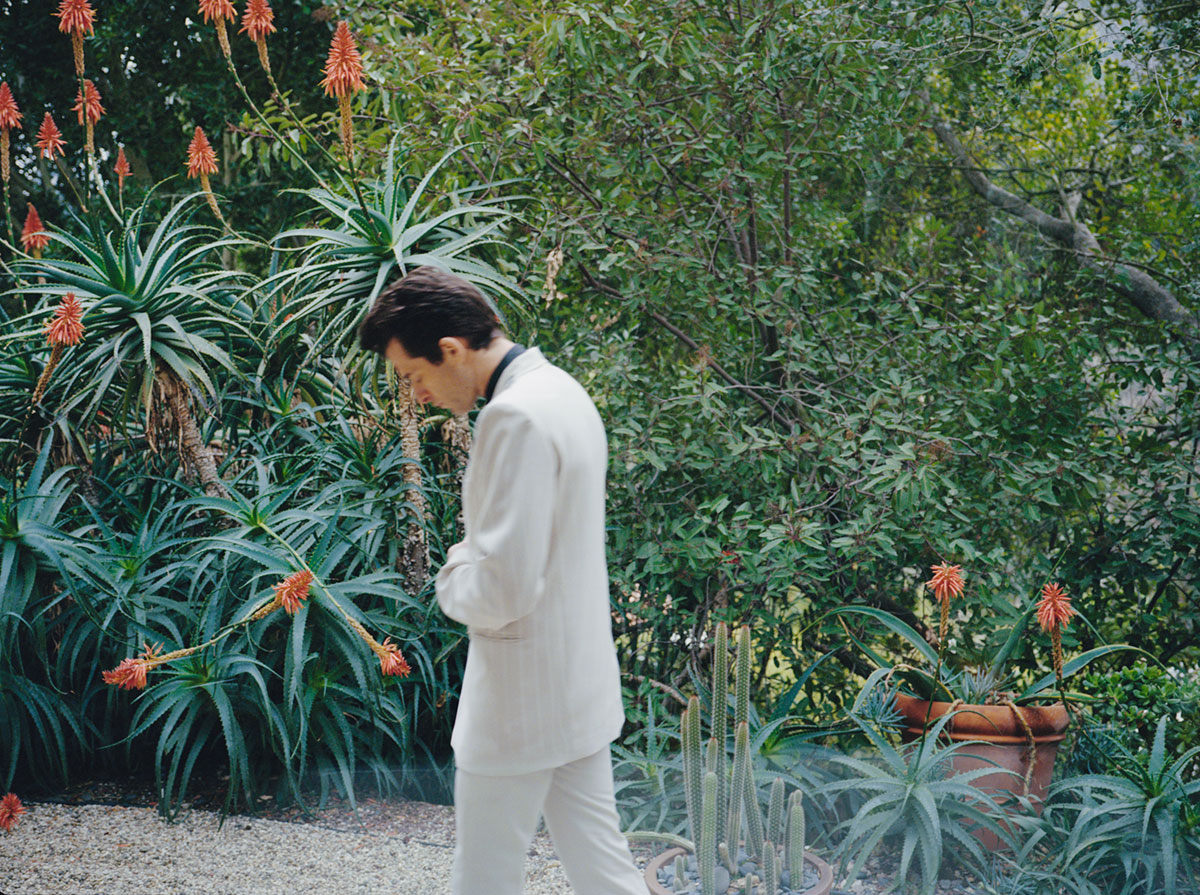
Jacket, Shirt, and Pants by Balenciaga.
Mark Ronson is a music savant with a Midas touch. As a producer, he is responsible for era-defining records from artists such as A$AP Rocky, Bruno Mars, and Amy Winehouse. As a musician in his own right, Ronson follows his instincts from his time as a DJ, elevating the crate-digging impulses of that craft to epic, highly orchestrated proportions. He describes his upcoming album, Late Night Feelings, as “a DJ breakup album” filled with “sad bangers” that layer complex emotions onto his signature grooves. The day after taking home a Golden Globe for his work with Lady Gaga, Anthony Rossomando, and Andrew Wyatt on A Star Is Born, Ronson caught up with his old friend and onetime girlfriend, the actress Rashida Jones, to discuss hustling hard and what makes them sad about the internet.
———
RASHIDA JONES: I looked at your Wikipedia page because I’m responsible and wanted to make sure I got everything right. You’re a pretty accomplished person. Congratulations on that.
MARK RONSON: Thank you. If you do one thing every year as you get older, your Wikipedia page will look impressive.
JONES: That’s true. You just had a recent addition: You just won a Golden Globe.
RONSON: We had a Grammy after-party one year and somebody said, “Where’s Mark?,” and somebody went, “Probably updating his Wikipedia page.” I reused that joke on Andrew Wyatt last night, because he was furiously typing into his iPhone while we were supposed to be taking some pictures or something.
JONES: You have a separate Wikipedia page just for awards and nominations. Did you know that?
RONSON: Yeah, but that could also just be called “The Page for That Song That Mark Ronson Did with Bruno Mars.”
JONES: Now it’s “Uptown Funk” and “Shallow.”
RONSON: Bruno Mars and Bradley Cooper have a similar timbre to their voice, so it makes sense.
Jones: You’ve worked with many, many talented people and I know maybe this sounds like a basic question, but is there a commonality in the way you work?
RONSON: Even though I know it’s stuff that I used to really bristle at—being known as the retro guy—I like a certain classic-ness and elements of live instrumentation in the music I work on. With somebody like Bruno, his work has elements of classic songwriting, classic performance, you can really feel it—the heart and soul. He’s the only person doing that right now, and I guess that’s why it fits into the criteria. Then there are just people you meet and you’re like, “Okay, this is a bit of a wild card. Let’s just do a day and see how it goes.”
JONES: When you’re working with an established artist, do you feel compelled to reinvent their sound?
RONSON: With a big artist, sometimes it’s a little more scary because there’s more expectation. There’s more pressure. You don’t want to thwart or burn any of their fans. Like Joanne, the album that I did with Lady Gaga—it was stripped back and took away some of the crazy theatrics that she had been beloved for. But at the same time, I’m never coming in, like, “Here’s the idea. We’re gonna change you and make you like this.” I meet an artist and I try to figure out what they want. When Gaga and I made that record, she came in wearing cutoff jean shorts and boots every day. It just seemed like the very logical progression of what she wanted to do.
JONES: Is it different when you’re working on your own albums?
RONSON: With my records, they’re always from my background as a DJ and playing in clubs in New York for 20 years. Everything always comes from the beat, whether it’s a live drum or a program beat on a drum machine. It’s always the groove first, and then we build the song on it. That’s how “Uptown Funk” and “Ooh Wee” were written. That’s how “Bang Bang Bang” was written. All of those songs usually come from a jam and a groove that feels good, because that’s what I’m always thinking about—how people move to shit. This is the first time, I think, where the emotion of something took precedence over the rhythm. It’s reductive, but the easiest way to describe it is as a DJ breakup record. It sounds a little like an oxymoron because it’s like saying “a librarian’s keg party,” but it is what it is. And there’s tons of amazing, sad dance music throughout history: “I Will Survive,” “I Want You Back,” every emo Drake song. I just haven’t ever dipped as hard into that on my own stuff. My friend Rory Phillips, the English DJ, coined it “sad bangers,” and it makes sense. Even if you were in the world’s happiest relationship, the time that we’re living in, how it feels to be living in America or anywhere in the world right now, is a little sad. I didn’t want to make it just all about heartbreak and love because there are other things that can make you sad.
JONES: What other things?
RONSON: Anything in politics.
JONES: The internet makes me sad.
RONSON: The internet is happy and sad. It has extreme highs and lows.
JONES: I find it mainly sad.
RONSON: You mean search engines, or just social media?
JONES: I feel like there’s just something sad about the promise of global connection through this thing that’s ultimately brought us further apart. I know that there are moments where you can catch up with old family members that you didn’t know were still around, or you can find communities online, but for the most part, it has brought an era of isolation.
RONSON: I don’t purport to know what it’s like to grow up right now, but the way that I felt at age 11, plus the pressure that’s happening now, I can’t even imagine.
JONES: With all of these delusional ideas of happiness out there, where does music fit?
RONSON: There’s still the very visceral feeling of a good song when it hits you. Adele or Frank Ocean—that’s something that you feel, and it will always be universal. But the way that we digest music, which is mostly through a small speaker on a phone, has already changed the way people make it. People only use certain snares and high hats because those are the things that are going to cut through. That’s why trap and hip-hop are very much winning everything on the sounds of now. If you’re not Post Malone, or you can’t make the RapCaviar playlist on Spotify, you’re already on an uphill battle to even get a decent chart position. It’s crazy making records how I make them now—mixing in this really fancy studio, making sure all the frequencies are beautiful in a way that maybe your dad would’ve made a record. Then I listen to it on an iPhone, after a Benny Blanco or Calvin Harris song, to make sure the vocal is coming through in the same way—it’s pointless. But anyway, I’m never really going to drastically change what I’m doing.
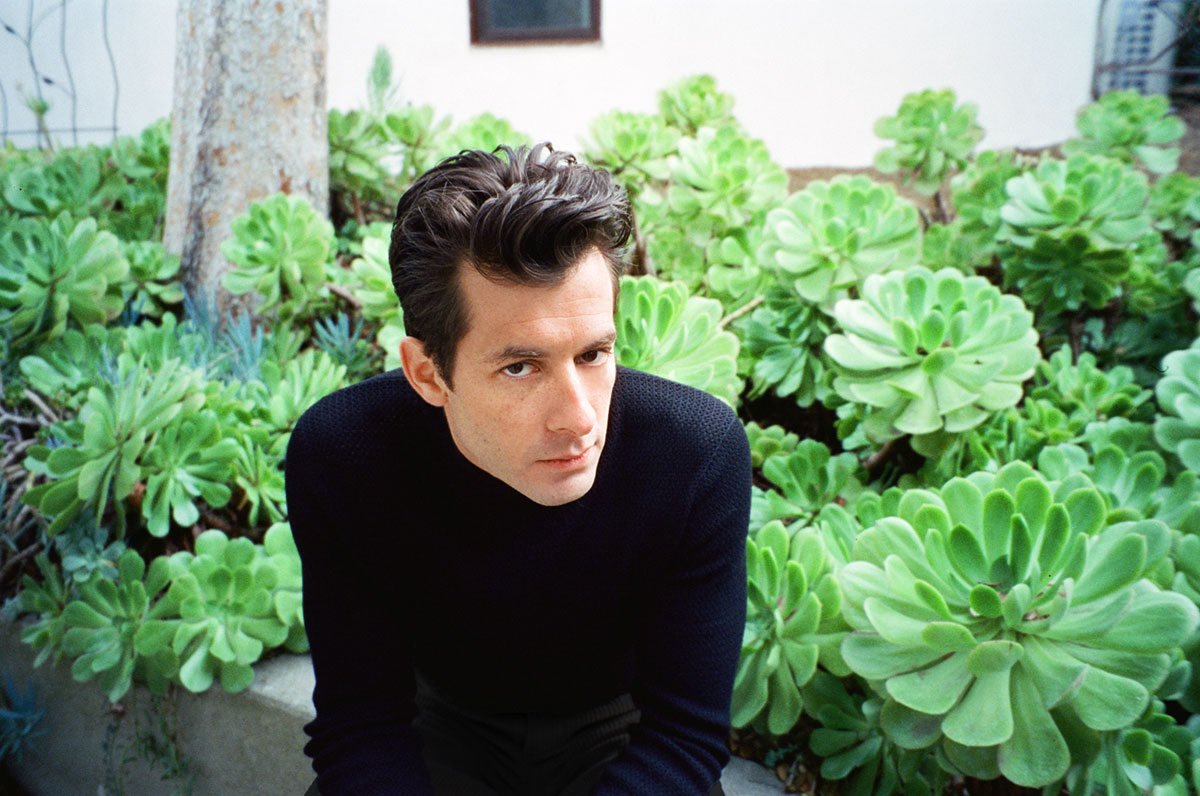
Turtleneck and Pants by Celine and Hedi Slimane.
JONES: You brought a lot of female vocalists onto this new album.
RONSON: You know, when you’re making a record, you’re making 30 songs just to get the best 10 or 12, so the stuff that was resonating, the strongest and the best stuff, all happened to be with a group of female collaborators. You have Lykke Li, King Princess, Miley [Cyrus], this songwriter named Ilsey Juber, who co-wrote “Nothing Breaks Like a Heart” and “Late Night Feelings.” That’s just who the crew became.
JONES: I feel like there’s a narrative that’s shifted in such a seismic way in the past year for women, specifically for American women. I know you well enough to know that you are somebody who is only interested in working with talented people, so maybe that’s a secondary thing, but do you have hopes in terms of this being a template for how creative things are made?
RONSON: I wish I could say I had a broader political intention or something, but it just happened that all of the artists I’m most excited and inspired by at the present moment happen to be female.
JONES: In itself, that feels like progress. Shifting back to your Wikipedia page for a second, I noticed that it gets much more detailed after 2006. But I’m more interested in what was going on before that.
RONSON: When you and I were together, we were really struggling and busting our asses. You were auditioning, getting some parts, but not maybe the way some of your peers were. I was completely not where my peers were. I remember coming up around the same time as Kanye. I actually remember meeting him for dinner one night, and it was just like, “I met this funny guy, this producer, who just dropped me off. His name is Kanye. How do you spell that?” That’s why I’m so excited for your success and everything that you’ve done. I know exactly how hard you’ve been working since you got out of college. I guess it’s the same thing with me. The only difference is that I had one record out, but it came out and sold 20 copies and I got dropped by Elektra.
JONES: I think that album is having a resurgence.
RONSON: The good thing about that record was that the song “Ooh Wee” was a hit in England. It was weird because I wasn’t expecting that. I wasn’t even thinking about England, even though I’m English. I was fully immersed in New York and I had been living there my whole life. So the fact that this song with Ghostface Killah and Nate Dogg became a hit in England, well, it gave me some sort of relevance and shelf life there, and it was why I later met Lily Allen and Amy Winehouse.
JONES: Not to be ultra-nostalgic, but when you think about the shit you were doing in the ’90s and the early 2000s—the things that were meaningful to you, like spinning for whatever rapper you were a huge fan of at REBAR—they ended up being such a big deal. It makes me wish that I’d done less striving to get out of that present moment, and appreciated it more at the time.
RONSON: I think there’s a magic thing in your 20s when you’re discovering what you really love doing, and you’re probably honing your chops. You’re not quite as good as you’re going to be, but you love it. I would DJ anywhere for, like, 75 bucks, and I remember you and your friends dancing in the corner of some tiny club in the early part of the night, because that’s when I’d get to play Aaliyah and all the good shit. It was so much fun. It was an amazing time in New York. I’d be DJing in a club and Biggie and Jay-Z would come down wearing matching white hats because it was Biggie’s birthday. Or Brand Nubian would be there. If Q-Tip would walk in the booth and finger through my records, I’d be bursting with joy and excitement, and trying to keep cool. It was an exciting time in New York, because it was before camera phones and even the smoking ban. I’m not saying I wish everyone smoked again, but people stayed out on the dance floor all night. Every now and then, some annoying breakdancing circle might erupt and you’d have to clear the room because some dude was doing fucking head spins, but it was a good time.
JONES: I want you to describe the feeling of two things: one, when you misfire and you play a song and you clear the floor, and two, the feeling when the floor is totally empty and you play a banger and everybody starts dancing.
RONSON: You want to take risks as a DJ, because otherwise you’re just a top-20 jukebox. So you’re trying to educate the crowd and play something that they might not usually get into, whether it’s a Maze and Frankie Beverly tune, or playing AC/DC for a hip-hop crowd. Every now and then, you are going to misfire. Sometimes playing at those hip-hop clubs, I’d get some wealthy drug dealer dude, who’s just at a table with champagne impressing girls, telling me at the booth, “What the fuck are you playing, white boy?” I remember that as a verbatim quote. Then there’s that mad scramble for what DJ Kay Slay used to call the “save your ass crate”—those 20 records that are going to get everybody back. The worst thing is clearing the floor with one of your own songs, because that is just like the double whammy.
JONES: I don’t even know what I want to say about the ’90s, but I just want to talk about the ’90s. Why is that decade so important?
RONSON: It’s funny to see nostalgia. Obviously Aaliyah was incredible because of the music that she made and just her overall spirit and vibe. She’s an icon, even more so obviously because she died tragically so young. But at the time none of us were like, “We’re in the ’90s, this is crazy.” Everybody was like, “Yo, the ’80s would’ve been so dope.” Or, “Imagine Studio 54 in the ’70s.” It’s like Midnight in Paris. There’s a nostalgic thing to eras past.
JONES: Mark, that’s not true. I feel like there was an energy because it was just pre-smartphone.
RONSON: It was totally fun. Don’t get me wrong. You were aware that you were in the middle of something, and that New York was the cultural and musical center of hip-hop in that era. There was obviously stuff happening on the West Coast, but Jay-Z, Biggie, and Wu-Tang—all the underground shit was in New York. So those people were out in the club, you’d see them while you’d be DJing and be like, “Holy shit, I can’t believe this one’s here.” It was this mix of drug dealers, skateboarders, athletes, musicians, weird fashion designers. It definitely was a cool melting pot.
JONES: I met you when you were 19. Do you feel like there could have been a totally other version of your life?
RONSON: I don’t think so. I never was good at anything else enough to be led down another path. I knew I loved music. I didn’t know if I was good enough at it to make a living, but I was doing whatever I could to be in this lane.
JONES: You could’ve had a label.
RONSON: I have a label.
———
Grooming: Jason Schneidman using THEMENSGROOMER.COM at SOLO ARTISTS
Photography Assistant: Colin Smith
Fashion Assistant: Malaika Crawford
Tailor: Hasmik Kourinian

